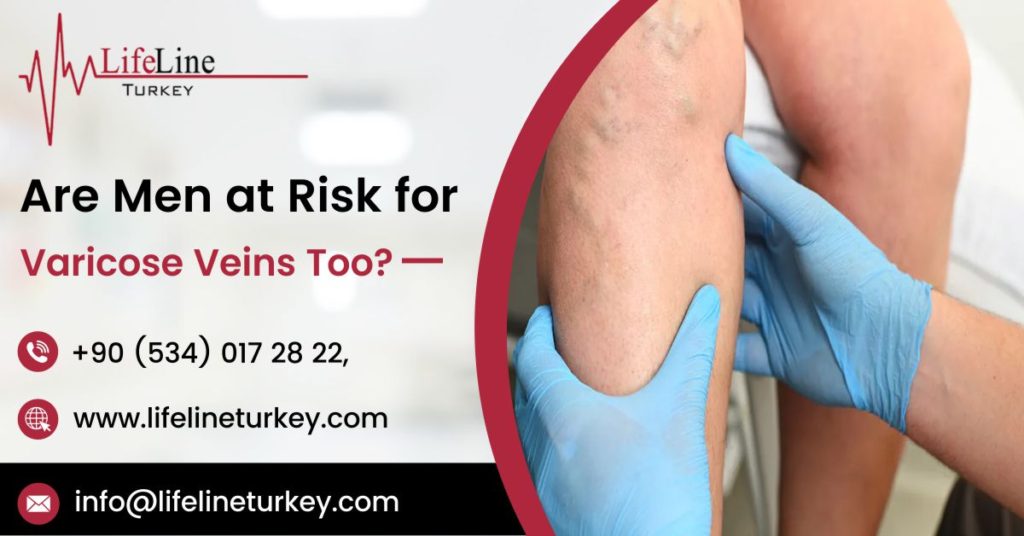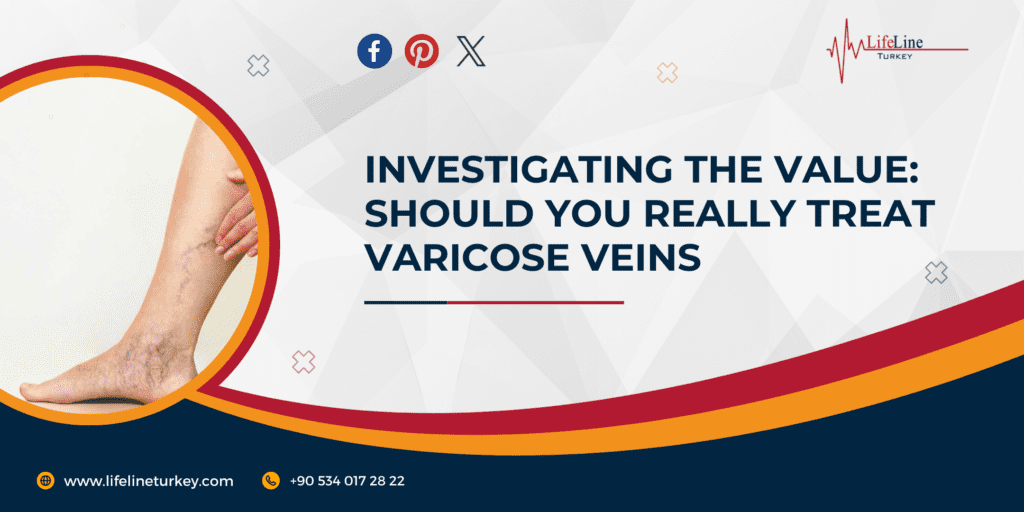Twisted, protruding veins, which often appear up on the legs, are called varicose veins. They are a common vascular condition typically associated with women, but men can also suffer from them. Despite misconceptions, varicose veins are not exclusive to any gender. This article delves into the causes, risks, and treatment of varicose veins in Turkey.
Understanding Varicose Veins in Men
Varicose veins occur when the veins become enlarged, swollen, and twisted, usually due to weakened or damaged vein walls and valves. They develop when the valves within the veins weaken or become damaged, causing blood to pool and the veins to swell. Varicose veins are more common in women, affecting up to 55% of women and 45% of men, but men are by no means immune to this condition. Several factors contribute to men’s varicose vein development:
- Genetics: Family history significantly predisposes individuals, regardless of gender, to varicose veins.
- Occupation: Jobs that involve prolonged standing or sitting can increase the risk of developing varicose veins. Men in construction, truck driving, or office work may be particularly susceptible.
- Lifestyle: Lack of exercise and a sedentary lifestyle contribute to poor circulation, a risk factor for varicose veins.
- Age: As men age, the risk of developing varicose veins increases, just as women do.
- Weight: Excess weight strains the veins, including those in the legs.
Symptoms of Varicose Veins in Men
The symptoms of varicose veins in men are similar to those experienced by women and may include:
- Visible, swollen veins appear blue or purple
- Aching or heaviness in the legs, especially after standing for long periods
- Swelling in the ankles and feet
- Itching or irritation around the affected veins
- Prolonged sitting or standing worsens discomfort
Risks Associated with Varicose Veins Surgery in Men
Varicose veins can lead to various complications, including:
- Pain and Discomfort: Men with varicose veins may experience aching, throbbing, or a sensation of heaviness in the legs.
- Blood Clots: In severe cases, varicose veins, known as deep vein thrombosis (DVT), can increase the risk of blood clots.
- Skin Changes: The skin around varicose veins may become discolored, itchy, or prone to inflammation.
- Ulcers: Varicose veins can cause skin ulcers, particularly near the ankles in advanced stages.
Body Parts Varicose Veins Surgery in Males Can Develop
In men, varicose veins can form in various body areas, typically lower extremities. Here are the common body parts where varicose veins may develop in men:
- Legs: Varicose veins in the legs are the most common presentation in both men and women. They may appear as twisted, bulging veins visible beneath the skin’s surface. These veins often cause discomfort, swelling, and aching sensations, especially after prolonged periods of standing or sitting.
- Thighs: Varicose veins can also develop in the thighs, although they may be less noticeable than those in the lower legs. However, varicose veins in the thighs can still cause discomfort and may indicate underlying venous insufficiency.
- Pelvic Region: While less common, varicose veins can also form in men’s pelvic region. It can occur due to pelvic congestion syndrome, where veins in the pelvis become enlarged and engorged, resulting in pelvic pain and discomfort.
- Scrotum (Varicocele): Varicocele is an enlargement of veins within the scrotum, similar to varicose veins in the legs. It is a common cause of male infertility and may also cause discomfort or pain in the scrotum.
- Feet and Ankles: Varicose veins can sometimes extend down to the feet and ankles, particularly when there is significant venous insufficiency. These veins may cause swelling, skin changes, and ulceration.
Treatment Options for Varicose Veins Surgery in Turkey
Turkey is a leading destination for varicose vein treatment, offering state-of-the-art facilities and skilled medical professionals. The following are some of the effective treatment options available in Turkey:
- Endovenous Laser Ablation (EVLA): EVLA is a minimally invasive varicose vein laser treatment in Turkey that uses laser energy to seal off varicose veins, redirecting blood flow to healthier veins. Under local anesthesia, it achieves high success rates with minimal downtime.
- Radiofrequency Ablation (RFA): Similar to EVLA, RFA utilizes radiofrequency energy to heat and close off varicose veins. It is an outpatient procedure that provides long-term relief from varicose vein symptoms.
- Sclerotherapy: This entails injecting a solution straight into the impacted veins, causing them to collapse and disappear gradually. It works exceptionally well on spider veins and minor varicose veins.
- Ambulatory Phlebectomy: We recommend ambulatory phlebectomy when varicose veins are near the skin’s surface. This procedure involves making tiny incisions to remove the veins.
What Happens if Varicose Vein Treatment is Left Untreated?
However, the most concerning consequence of neglecting treatment is the increased risk of severe health problems. Here’s a breakdown of some potential complications:
- Skin Ulcers: Varicose veins’ compromised circulation can prevent oxygen and nutrients from reaching the skin tissues in the legs. It can cause open sores or ulcers, particularly near the ankles. These ulcers are prone to infection and heal slowly.
- Lipodermatosclerosis is when the fatty tissue under the skin hardens due to chronic inflammation caused by varicose veins. It can cause a change in skin texture, making the affected area red, itchy, and painful.
- Superficial Thrombophlebitis: This is an inflammation of a varicose vein caused by a blood clot. The impacted area turns red, swollen, and sensitive. While not life-threatening, it can be excruciating and indicates an increased risk for more serious clots.
- Deep Vein Thrombosis (DVT): This blood clot forms in a deep vein, usually in the leg. DVTs are a severe medical condition because a clot can break loose and travel to the lungs, blocking blood flow and leading to a pulmonary embolism. They can be fatal, so you should get medical help right away.
Take the First Step: Consult a Varicose Veins Surgery Centre in Turkey! Varicose veins are not just a concern for women; men are also at risk for this common condition. Men can take proactive steps to maintain their vascular health and reduce the risk of developing varicose veins by understanding the risk factors, symptoms, and treatment options. If you have varicose vein symptoms, see a healthcare specialist at Lifeline Turkey for a correct diagnosis and treatment plan. Remember that caring for your veins is critical for your health and well-being. Furthermore, varicose vein treatment costs in Turkey are reasonable, so contact us immediately to learn more about the process.


